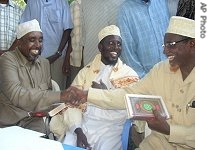2006年VOA标准英语-Talks Open Between Somalia's Parliamentary Spea(在线收听)
By Cathy Majtenyi
Nairobi
07 November 2006
The speaker of Somalia's transitional government and members of the Islamic Courts Union are meeting near the Somali capital one week after negotiations between the government and the Islamists collapsed in Sudan.
-----
The Mogadishu-based news editor of Horn Afrik, Mohamed Dhoore, tells VOA that parliamentary speaker Sharif Hassan Sheikh Adan arrived in the capital Sunday and held closed-door meetings before talks officially opened Tuesday in the nearby settlement of Afgoye.
 Sharif Hassan Sheik Aden, Speaker of the Somali Parliament, left, senior Islamic official Sheik Sharif Sheikh Ahmed , middle, and leader of the Islamic movement Sheikh Hassan Dahir Aweys, right, meet in Mogadishu, Tuesday Nov. 7, 2006 |
||
Dhoore says the parliamentary speaker is being accompanied by about 50 members of Somalia's parliament, which is based in the town of Baidoa.
Negotiations between Somalia's transitional government and the Islamic Courts Union collapsed in Sudan on November 2.
Those talks were meant to finalize an interim peace accord that the two sides signed in September in Sudan that, among other things, called for the creation of a joint national army and police force.
But the Islamists said they would not continue negotiations until all Ethiopian troops that are supporting the transitional government leave Somalia.
And the government delegation split just before the start of the negotiations, when parliamentary speaker Adan said he would not attend the talks in Sudan because of a dispute with the president over who would head the delegation.
Journalist Dhoore says the divisions within the government are a major reason why he thinks this latest round of talks will not be successful.
"Many people believe that this will do nothing to solve the Somali problem. There is a great difference between top officials of the government such as the prime minister, parliamentary speaker, and president about how to face dialogue with the Islamic Courts," he said.
Fears of all-out war have been escalating in recent weeks, as witnesses reported seeing troops from both sides fortifying their positions in and around Baidoa.
Since civil war broke out in 1991, militias loyal to clan and sub-clan-based factions have controlled different parts of the country, with no central authority to provide law and order or basic services to the population.
A transitional Somali parliament was formed in Kenya more than a year ago following a peace process.